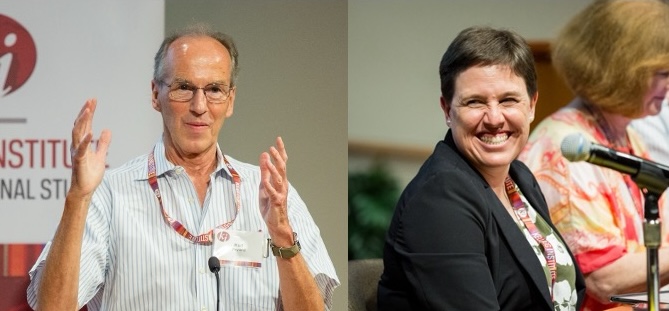Global Stage Podcast
 About the Episode:
About the Episode:
Show Notes:
To begin, both Laura and Kurt describe how they would assess the health of democracy today. Laura starts off explaining that democracy is in the woods – it’s not a disaster, but not healthy either. There are a few strong democracies in the global north and there are important structural systems that cause problems and misrepresentation for democracy. Kurt agrees that democracy is not as bad off as people think and that there are less drastic and dramatic challenges, but more sneaky ones. These problems are harder to identify and counter. Populism has a variety of roots with cultural backlash, and values change where decision making is distant for common citizens. Because this threat is so varied and from multiple sources, it is not very easy to counter. There is not one specific measure or strategy that works, but it is very context-specific. One can start with constitutional strategies like elections, but there are not many options for those who want to oppose. It raises the question of how far you go and this could become undemocratic and create a political moral dilemma. Laura says there is backsliding in democratic regimes moving toward authoritarian regimes, but the safest gamble is to try to protect institutions you have left and don’t put them at risk. Protests can also be incredibly useful if they have specific goals, like stopping a certain democratic reform, and if they remain truly nonviolent.
Next, both Laura and Kurt discuss the contextual differences across the internationalization of these processes across countries. The countries are learning from one another and repeating in various places. There could be limits, but these countries are not only good at repeating these processes, but also in reading their audiences. Some autocrats took over during COVID to implement emergency measures to increase their own emergency power, but others didn’t. Autocrats are normalizing the populace to undermine democracy. They don’t want to be seen as clones, but as their own person. With regard to economics, Kurt doesn’t see economic factors as very important, but democracy is more solid in more developed countries. For cities in crisis, inflation or recession could also play a role in their economy. He states that economic shocks affect democracy the most in crisis and with populace leaders. Laura believes that countries in crisis have their democracy affected when democracy is not delivered, or there are big promises without support. This can cause people to feel desperate and not represented. Lastly, Laura is hopeful for the future of democracy because of Guatemala and the impressive organization of social movements into political parties. Kurt speaks of Poland and says that democracy is not easy to overturn – democracies have survived with flaws and deficits, but democracy still hangs on.
Links:
Learn more about Laura Gamboa.
Learn more about Kurt Weyland.
Learn more about the Kellogg Institution for International Studies.
Listen below, ask your smart device to “play Global Stage Podcast,” or find us on:
Apple | Spotify | Stitcher | iHeartRadio | TuneIn | Youtube





